Ali Jamal is one of life's winners. An hour in the room with him and you'll understand how the man can manifest success. And boy, has he had some of that.
In the six years since founding Azura Partners in 2019 with just three team members, he's built his company up to 65 employees, and seven offices – in London, Monaco, Geneva, Dubai, Singapore, Miami and New York. His assets under management have ballooned to $5bn, thanks to a client base with an aggregate $100bn net worth across the Middle East, EU, Latam and Asia.
Not bad for a man who began his career in the Kuwait Armed Forces. Having since worked in private banking at a trio of Swiss institutions – BSI, Credit Suisse and Julius Baer – Jamal decided he could do it different and do it better.
It's an inspirational growth story from an industry historically famed for its closed doors and glacial progress. But as Jamal explains, speed is the secret to his success. Well, one of the secrets. Azura's rapid global rise, recently cemented by a landmark strategic investment from Lunate in April 2025, has been the key to its momentum. As you'll discover in our exclusive interview, you need to be a people person, too, if you want a stab at the best job in the world.
Square Mile: You've reached $5bn AUM in six years – an impressive feat, especially given the challenges of Covid and the current geopolitical landscape. How have you managed such growth?
Ali Jamal: Over the first five years, we were absolutely laser-focused on laying a robust foundation for the group on a global scale. From the outset, our vision was clear: to establish ourselves as a truly international player within that initial five-year window.
We managed risk carefully, but our biggest strength was our willingness to act decisively and not be afraid of making mistakes. Our focus was always on executing the strategy with discipline.
This clarity of purpose, combined with our emotional intelligence, our open and constant communication with clients, and above all, our independence, has been critical. These qualities have resonated deeply with our network, and I believe have truly set us apart during what has undoubtedly been an exceptionally challenging period globally.
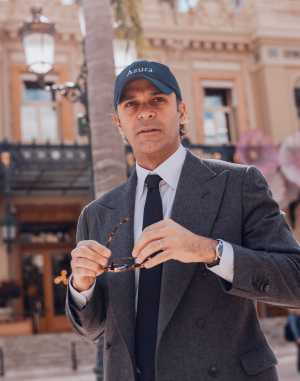
SM: Azura has already gained a reputation of being a more inventive wealth manager than much of the old guard. What's led to this?
AJ: What matters most to our clients is that we serve them globally. Today's Ultra High Net Worth Individual is a true global citizen – building lives, businesses and legacies that transcend borders. They deserve a partner who can navigate the entire global landscape, not one who is limited to a single jurisdiction.
It's also about attracting top-tier talent – bringing on people who already have incredible relationships with their clients. We have built a home for talent who already engage with their clients emotionally, who have been servicing a client for, say, 20 years. I can then help take them to the next stage in their career.
Finally, what sets us apart is that Azura is not just about me – it's about building a shared vision, now accelerated by Lunate's strategic backing.
Lunate is an Abu Dhabi-based investment firm that has grown to more than $110bn in AUM in just two years. Like us, they believe speed matters and share the ambition to become a global champion in their field. They chose us for their first move into private wealth management – a powerful endorsement. Out of all the firms in the world, Lunate's decision to partner with us speaks volumes about the strength of our model and the trust we inspire.
Today's UHNWI is a true global citizen – they're building lives, businesses, and legacies
SM: Where do you source new clients? Is it mainly word of mouth?
AJ: Yes – referral. I say this to each of my new clients: 'You pay me a retainer for the year; if by the end of the year, you're not happy, I'll pay you back your money. If you are happy, we can do one of two things: (1) you refer another of your friends to me, or (2) you pay me a little bit more. So far, all my clients have opted for number (1).
Hiring top talent has been crucial for us in expanding our client base. We've designed Azura to attract the best private bankers worldwide. When they join, their clients transition smoothly, because these bankers have built and owned those relationships over many years.
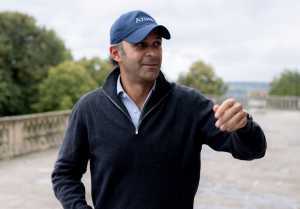
SM: Your background includes leadership roles with some big hitters. What insights from these experiences have shaped your vision for Azura Partners – for good or for bad?
AJ: Anybody can make money. The real challenge is how to grow and scale the business properly.
One of the biggest problems I see in large European banks is that they don't promote young people and create leaders within the organisation. We saw this clearly at Credit Suisse and other major European banks. When senior people leave, there isn't a strong second line ready to step up.
American institutions don't have this problem. At firms like Goldman Sachs and JP Morgan, when a CEO or top partner leaves, there is an army of well-prepared leaders ready to take over. Even if 20 or 40 partners leave, they have a deep bench to fill the gaps without missing a beat. This is not simply a matter of opinion but something the last 10-15 years have repeatedly demonstrated.
SM: Global wealth management has evolved a lot in recent years. Where is Azura Partners' place in this landscape?
AJ: Wealth management is divided into three segments: $1-$10m net worth – whoever has the best app will be the winner here; technology is the differentiator. Then you have $10m-$50m net worth (HNWIs) – this is market segmented, highly competitive, you need to be in Zurich, in Dubai to focus on these guys. Then you have the Champions' League – the Ultra-High-Net-Worth Individuals. This is the segment we are in. It has cost me a lot of time, energy, money and travelling to get here. In 2024, I spent 850 hours in the air. This year I am already at 360 hours and while I hope to fly less than last year, who knows?
Our clients are global citizens: they will summer in the Mediterranean; head to New York for Fall; you'll see them in London during Frieze or Wimbledon. As a wealth manager, you need to adapt to this. So I have an intense travel programme that reflects this. But this is the culture I am trying to create in this company. If a client is paying us hundreds of thousands in fees, they deserve a plane trip to have lunch or dinner in person. This is something that the larger institutions cannot do. Bringing the human touch makes all the difference.
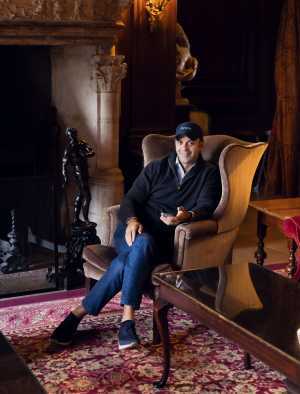
SM: As someone with a strong military background, how have your experiences as an officer in the Kuwait Armed Forces influenced your leadership and decision-making style at Azura Partners?
AJ: As an army officer, you might be 18 years old – this was the age when I became an officer; I was young – and you have 30-40 soldiers to manage, all of them older and more experienced than you. How do you manage them?
You could do it by fear: "I'm the boss. You have to listen to me; I give you orders and you follow." This is the most basic form of leadership.
Or you could manage them with empathy – by essentially being a nice boss.
But in the military, what they teach you is a third way: to manage by respect. Let's say you have to get out of a tank – you have to be the one who goes first, to show them the boss is there for them. The military also gives you discipline on a different level. And whatever the scenario, whatever the conditions, it gives you the belief that you can make it work. This ties in with the ability to adapt. For example, one day I have to meet with someone from China, then Singapore, then America; it's not easy, but adaptability is crucial.
Last but not least, the military makes you a team player. They will never tell you 'one guy can win'; it's the team approach – paramount to running a company.
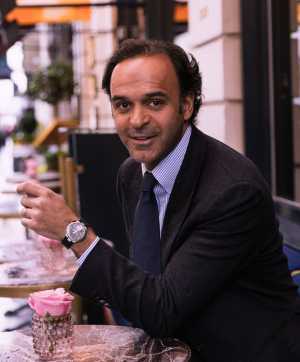
SM: How important was your education?
AJ: After I finished high school, I went into the military: this was an education of sorts – in discipline, fitness and leadership.
When I came to the UK, I studied engineering – I came first in my class so they gave me a scholarship to study here. It was here where my mind began to be opened. I started to think, 'What am I doing in the military? Look how much I am learning here!'
When I went back home to Kuwait, I had already decided I wanted to do an MBA next. I was flying in and out of London every week to do my MBA studies until the military caught me – and didn't allow me to fly any longer.
I spoke to my dad about it before he passed away, and he said: "You have to decide: do you want to invest in your education? Or do you want to jump out of a plane for a living?" I said: "Education." So I resigned from the military – and pursued my career in banking.
At the time, the Kuwait government ran a leadership programme to send a number of Kuwaitis between the age 30-40 to Cornell. More than 3,500 applied; only 100 selected – and I was one of the lucky ones.
Whatever they do in Europe, higher education in America is on another level. I was so impressed that next, I paid for myself to go to Harvard. It's a game changer. Let's say you attend ten classes: seven might not be relevant to your future, but three will change your life. The network, the knowledge, and the know-how offered by the Ivy League is off the charts. You have to give it to the Americans: bring a business case to 50 smart people sitting in one room, and you'll get at least 25 solutions to the problem.
Education changed my life. And we try to do the same at Azura Partners too, with internship programmes as well as sponsoring partners to undertake MBAs.
The Gulf states are about 50 years old. My grandfather travelled by camel – and by Concorde
SM: What are your priorities for Azura Partners' next phase of growth?
AJ: Technology is one: we are lucky as we don't have legacy IT. Ask any CEO or COO of a big institution, and they'll tell you one of the biggest problems is legacy IT.
We're integrating AI, which is helping to free up time for the investment team, and for the solutions team. But of course, it cannot replace the human element.
We plan to open offices in Zurich and Abu Dhabi next, and we're also exploring Riyadh as a future possibility.
I've been really impressed with the speed of development in Saudi Arabia. Will they make mistakes? Sure. But they are growing. European countries are thousands of years old; the Gulf states are about 50 years old. So much has changed. A whisky bottle you have at home might be older than our region. My grandfather travelled by camel – and by Concorde. And now the same generation will see EV helicopters flying in the next six months.
The first five years have been about building Azura Partners 1.0. One, we build a brand. Two, we become super profitable. And three, we attract tier-one talent across industry; we don't do this just from banking – but from luxury, realty, technology. I was really ruthless about being global from the outset. We have a multicultural team – more than 25 nationalities, speaking 20 languages. Rooted in independence and innovation and now supercharged by global investment, we are reshaping private wealth management and rising as a global powerhouse in our own right.
SM: Beyond new offices and expansion into new territories, what other plans do you have for the next five years?
AJ: In five years, I want us to be recognised as a brand globally. In the old days they said, if you want to be an investment banker, you should work for Goldman Sachs. If you're buying a watch, you should buy a Patek. In five-to-ten years, I want people to say, "If you want to be in wealth management, you should be at Azura." For me, that would be the ultimate success; I don't want growth for the sake of growth.
Look at VW versus Ferrari. VW produces nine million vehicles a year and owns all these different car and motorbike brands. Meanwhile, Ferrari produces fewer than 14,000 cars in a year. Yet Ferrari has twice the market cap of VW. I want Azura to be the Ferrari of wealth managers.
SM: And on a personal level – how do you keep your head in the game? Fitness must be important?
AJ: I have to exercise five to six days a week – and take my heartbeat to 180. I do 20-30 minutes of intense exercise. And I also fast twice a week, for 16-18 hours.
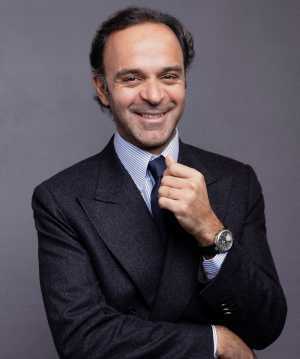
SM: I noticed you're wearing an FP Journe. Are you a collector?
AJ: That FP Journe is more than 11 years old. Eleven years ago, not many people were buying FP Journes.
I bought my first Richard Mille -- an RM 11 -- back in 2010. It was unfortunately stolen a few years later, but it remains my favourite watch I've ever owned. Again, people back then would ask why I was buying these watches? I said, "One day you will see." Richard Mille as a brand embodies everything we believe in: independence, bold thinking, and a willingness to challenge the industry. We've partnered on events together because our core values are so closely aligned.
I love watches – they're a great asset to have, but I don't sell them. And as I didn't inherit any of them, every one of them has a story with it. My collection grows with me. I always wear them and get the most out of them – I don't just leave them locked up at home.
Never leave a negotiation without putting a smile on the other side of the table.
SM: What makes you most happy?
AJ: I love to put a smile on the faces of those around me.
I lost the most important person in my life -- my father -- and what helped me most was the support of my friends and family. My wife Mariangela was a huge support, and I'm very grateful to have her. The people around me did an incredible job of helping me get back on my feet, and now it's my turn to give that back.
It also happens to be an effective negotiation technique. Never leave a negotiation without putting a smile on the other side of the table.
What else really makes me happy is when I challenge the norm and I win. If someone says, "No way he can do this," and I prove them wrong. Eight out of ten people said I'd go bankrupt in three years. And I thought, 'OK, I'll show you.' And now they come to me with respect.
I don't believe humans have a limit. Take someone like me: 25 years ago, I was sitting in a tank, in the middle of the desert, freezing temperatures over night. And now I live in Monaco and a client sends me a G5 to take me to a meeting.
Sure, it's been hard work – but I don't believe in limits. The word doesn't exist in my dictionary.
SM: If you were to retire now, where would you go and what would you do?
AJ: From this job, you can never retire. This is the only job in the world where you will always eat well – you meet wealthy people and go to nice restaurants; you will always dress nice as you're meeting beautiful people; you will always be sitting opposite someone who is wealthier or smarter than you – probably both – so you will learn something. It really is the best job in the world.
For more information, see azura.com.
